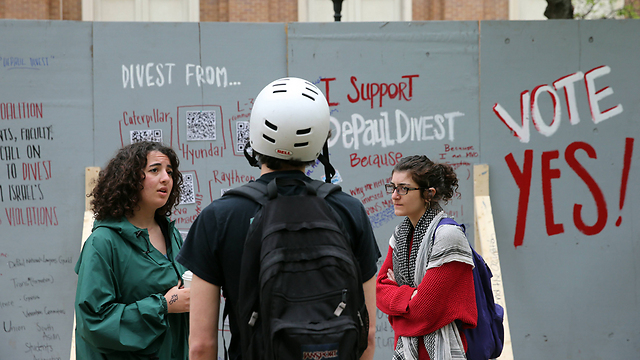A recent anti-Israel demonstration at the University of Michigan that was allowed to take place during Rosh Hashana — when most Jews would be off campus — is reflective of a wider attitude on campus, a Jewish student wrote.
By: Lea Speyer, The Algemeiner
In an oped last Thursday in the student newspaper, The Michigan Daily, University of Michigan student Gabrielle Roth said, “We are told we don’t know how it feels to be ostracized and oppressed, and thus can’t participate in conversations revolving around diversity and inclusion.” However, she wrote, “One group’s pain and oppression shouldn’t be measured against another group’s pain and oppression — this is useless and hurtful.”
Roth expressed outrage over the “apartheid wall” and mock Israeli checkpoints erected on campus during the Jewish New Year, which she first learned about while she was at synagogue last Tuesday. She said she was “surprised to hear, between prayers, whispering’s from my peers: ‘There’s an anti-Israel wall in the middle of the Diag.’”
“To have [such a] display on a day when Israel’s advocates can’t adequately respond is conniving and corrosive to the dialogue many students who are passionate about the conflict have worked so hard to establish,” she wrote, adding that this is but one of many instances in which she felt “excluded from the larger narrative on this campus because of my Jewish identity.”
Students Allied for Freedom and Equality (SAFE) — the anti-Israel group behind the display — “has tactfully chosen to demonize Israel when its Jewish supporters were unable to participate in the conversation.”
Jewish students at the University of Michigan were “deeply offended” by the SAFE demonstration, which is part of Palestine Awareness Month. Those members of the Jewish community who remained on campus during the holiday were “left to cope…without the support of many of their peers,” the school’s student newspaper reported.
In response to the anti-Israel demonstration, students launched a petition calling on the school’s president, Dr. Mark Schlissel, to condemn the event and its props, writing in part, “We speak on behalf of many students in the Jewish and pro-Israel campus communities and we write that yesterday we felt ostracized and excluded as many of us sat in synagogue unable to share our stories.”
This is not the first time SAFE has sparked controversy at the University of Michigan. In 2015, the group filed an ethics complaint against a Jewish member of the student government, after he voiced criticism of an anti-Israel protest. Following a probe, the Central Student Government decided it would not seek disciplinary measures against him.
